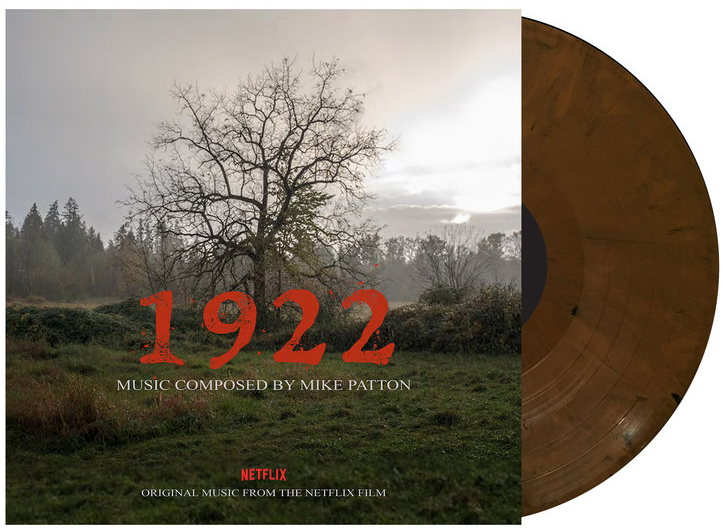The Sounds of 1922: How Mike Patton Adapts to the Role of Film Composer
The rock legend behind Faith No More, Mr. Bungle, and more talks about how composing film scores is different from working in bands.
There are some people in the world of entertainment who you could classify as unstoppable forces. That designation is most prominently displayed by the one and only Mike Patton. If you’re reading this now, chances are you came here because you know who he is and how many different projects he has his hands in. The front man of Faith No More, Mr. Bungle, Fantomas, Tomahawk, and Dead Cross shows no signs of slowing down. Patton has long displayed an interest in the world of film and film composers, so it was no surprise when he started booking gigs scoring films. Whether it’s one of his distinctive interpretations of other artist’s songs (“Midnight Cowboy,” “Deep Deep Down,” “She’s Gone Away”), or the entire Fantomas album, Director’s Cut, which consists only of film score and original song covers, you can see that cinema has been a major influence on him.
With a handful of film scores now on his resume, it seems like it would be a simple process for Patton to get new scoring jobs, and in the case of Netflix horror film 1922, that actually was the case. “I got a call from my agent who works with [1922 director] Zak Hilditch,” Patton says. “He literally just bumped into him in the hall and suggested we work together. So that’s how it happened. It was very simple.”
Though this is an abnormality, you might expect directors who are familiar with Patton’s work, or were fans themselves have been reaching out for his talents, but this is rarely the case. “Normally it’s a giant process where you have to bug people and get your name into the mix,” he says. “This time, thank God, that didn’t happen.”
While 1922 has been streaming on Netflix since October 2017, its soundtrack is only now getting a release. The boom of streaming services means many films are getting instant distribution, but without all the bells and whistles of larger studio releases. So this summer, through Ipecac, his own label, Patton released what you could consider the “Extended Edition” of the film’s score, including tracks that didn’t make it into the final film. “I don’t know how to put together a soundtrack, but I know how to put together a record,” he says. “So what I did was basically take some themes that we used that they used in the film and then made a record out of it.”
“[Netflix] were very thrilled that we were going to do a record at all,” Patton says. “Soundtrack music is not a commercial entity these days. That’s very funny to me because I hear it that way, but the public doesn’t.” Patton knew from the very beginning, putting out this record was going to be part of the deal, and he was met with little to no resistance from the streaming giant. As he puts it, “Netflix, they’re very cool. They’re not like a normal movie studio. That really helped me to be more creative and put out the record that I just did.”
Being the co-owner of a label like Ipecac Records–home to an wide array of artists ranging from the grinding rock sensibilities of The Melvins, to the experimental hip-hop outfit Dalek, and even modern classical composers such as Eyvind Kang–offers Patton all the freedom he needs. “Where the hell am I going to put something like this out?” Patton says. “It’s only going to be on my own label. It’s a real comforting thing to know whatever I’m creating, whatever I’ve done, at some point, if I want it to, will come out, and I can do it exactly the way I want to.” While Netflix offers artists a fair amount of creative freedom, so did the director. “I must say, Zak gave me all the freedom to do what I wanted with 1922,” Patton says. “He simply told me, ‘make it creaky, and make it sound like an antique; very broken and very dreadful.’ I said, ‘I can do that.’”

Patton has been a consummate collaborator for his entire career. Whether it’s a new band he is forming, joining, or lending his vocal and musical talents to, he is never afraid to get in the mix with others. Working on film music however, leads to a different type of working relationship. “The one thing that I could tell you is, basically when you’re doing a film you’re at the whim of a director and the image that’s on screen,” he says. “I try my best to deal with that. It’s not about me, it’s about them. It’s a weird team effort.” Though, while being a team effort, it doesn’t mean that as a creator, Patton isn’t going to try to do something a little different, but as he puts it, “Sometimes, you fuck up, and sometimes it’s not right. You rely on the director to tell you, ‘hey, dude, you’re going way too in left field’ and he’ll bring me back and that is wonderful. I love that.”
Relationships aside, Patton has always been one to push the musical envelope. Maybe it is something he consciously chooses to do, or maybe it is something that just comes naturally to him, but it’s something that has to be kept it in check when it comes to creating a score. “Well, it’s kind of what I do,” he admits. “But, let me make a distinction here: when I’m making music for films, things are very different. When you’re doing your own band, or your own project, that’s a whole other set of parameters. When you’re working on film, you say to yourself, ‘time to reel it in, and do what is necessary.’ It’s very different from being in a band, where you can say that you’re creating your own narrative and landscape. In a film, I’ve gotta take the back seat. I mean, I’m not telling anything you don’t know, but music is the last thing they think about. So, what do you do? You’re kind of polishing a turd, in a sense. You have to really think about what this scene needs. What can I do to make this better? That’s it.”
While the source material or the end result itself might be of interest to him, during the actual process, it is not part of this method to really care about the film or its narrative as a whole. “The film itself is not my concern,” Patton says. “I just want the music to elevate a scene, from point A to point D. The rest is not my concern, because they’re going to do what they want with it. So what I do is, I give them tracks, or pieces. I tell them, ‘I think this works for scene 1, or scene 12.’ Then, they decide, and I’ve learned over the years that basically, I can’t control that. So I’m cool with letting them use whatever the fuck they want.”
Despite his long career, and the many musical scores he has under his belt, Mike Patton is still a novice of sorts when it comes to film composing. No matter how many years he has spent in the music business, there are still those facets of being on call to someone else’s needs that takes more time to get used to. “I don’t think that I’ve mastered it, by any means,” Patton says. “Everything that starts with a director starts on the telephone. You have a phone call, and someone will tell you they want this and that. And you throw your ideas out there, but you have to be very guarded about what you suggest. I’ve lost a lot of gigs by being too adventurous. That shit comes back to haunt you a little bit. There have been tons of projects that I really would have liked to work on. This is something I want to do, and I think I’m pretty good at it, but I’m not right for everybody. I understand when I have a conversation with a director and I’ll explain what I want to do, and he’ll go, ‘OK, great, call you next week.’ That means, ‘Fuck You.’ I’m used to that though, it’s totally ok. You have to throw your ideas out there, otherwise, what are we doing here?”
If you’ve ever seen Patton on stage, you know he still puts himself out there with every performance, never holding back physically or vocally. However, there may be a day where he thinks to himself, I need to pull it back a bit. Could film composing be the perfect outlet to start a transition from one part of his career into another? While hesitant at first, Patton confirms that there’s not a specific plan out there, but it is probably the way things are heading. “In terms of my career, I’m just doing it, but the simple answer is, yes, I would like to do more soundtracks,” he admits. “I’ve been in a band for, ugh, many bands, for 30 years. So, to me, making a soundtrack is something that is close to my heart. I’m a big fan of film composers, but also, it keeps me at home. It’s not a new band that I have to tour, so absolutely, I hope I can do more.”
Patton does a lot of cover songs, and thus has a better handle on what it is like to work with another artist’s material than most people. Because, when someone announces there will be a remake or reboot of a classic/beloved film, everyone loses their minds. But when someone announces their next album will have a cover song on it, while some people might not like the outcome, it isn’t met with the same outrage as a movie remake. “I think John Huston said it best, I could be wrong here, but I think he simply said, ‘Why remake a great movie?’,” Patton says, “and I totally agree. They are going to happen though, I actually just got offered to do a score for a big remake, and we will see if it happens. But I totally dig what he is saying. If the movie is perfect, don’t fuck with it.”
Now, it is at this point I’m going to get a little personal. I couldn’t help but bring up the cover of Bob Dylan’s “The Ballad of a Thin Man,” by the Jamie Saft Trio that features Mr. Patton on vocals. It’s a classic Dylan song. He wrote it, he sang it, he tripped people up with it. But when you listen to Mike Patton sing it, it’s a different world. It is a wave that creeps up on you and tosses you into the air, slams you down, and then rocks you to sleep at the end. Dylan couldn’t do that, but Mike Patton could. If you don’t take the shot, how do you know what could have been? So why is remaking a song different than remaking a film? “You know, all I did there was my job,” Patton says. “If that took you on a journey, that’s wonderful. But the feeling with stuff like that is, it is getting to work with friends, so it just ends up being that idea of, whatever happens, happens. You don’t know how that’s going to land with the public.”
To purchase the colored vinyl release of the 1922 score, click here. For the CD release, click here.
Read the latest Den of Geek Special Edition Magazine Here!
